The empirical case studies, WP3 on mass grave exhumations and WP4 on war museums, also initiate their work from the very start, as they take advantage of the seminar in Month 2 in order to develop comparable research questions and methodology. During the first two years of the project WP3 and WP4 will generate new empirical knowledge on the distribution of different modes of remembering in different memory settings (hot or cold), in different cultural contexts and among different stakeholder groups, which on the one hand will feed into WP2, and on the other will be disseminated and discussed at a transnational workshop for all stakeholders in Berlin in Month 24, organised by WP5. WP3 and WP4 bring together stakeholders (policy makers, cultural heritage professionals, creative artists and popular movements) throughout the research at the sites, and we regard this communication as impact. However, the bringing together of stakeholders in a transnational setting in Berlin takes this impact to a new level. A special issue of a peer-reviewed international journal will be published, based on the papers presented at the workshop.
The cultural events, the theatre performance and the museum exhibition, created by WP6 in collaboration with our non-academic partners, the theatre company Micomicón and The Ruhr Museum in Essen, are scheduled to take place during the second year of the project. Consequently, the initial preparations must take part during the first year (dialogue with the partners and planning), while the findings of the reception analysis will be processed the third year. A report with policy recommendations on the exhibition and a didactic package for the future use of the play in other cultural settings will be produced at the end of the third year
Apart from bringing together stakeholders at the sites of investigation (P3 and 4) and the creation of cultural events (WP6), the project’s most important impact activities will be coordinated by WP5 on Communication and Training. WP5a (Knowledge exchange and dissemination) will organise three major conferences with stakeholders (start, midway and end) in order to clear the expectations of partners and stakeholders, communicate the findings across the consortium and stakeholder groups and finally assure the dissemination of the results of the project. WP5b, on the other hand, will develop different kinds of training resources, based on digital on-line platforms or analogue material, that will allow memory practitioners (museum professionals, teachers and others involved with commemoration projects) to engage with the ideas which inform UNREST.
Pages: 1 2
